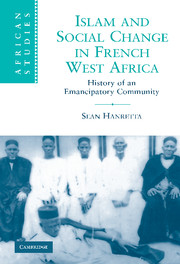Book contents
- Frontmatter
- Contents
- List of maps and figures
- Acknowledgments
- Note on orthographic conventions
- Abbreviations used in references
- Introduction
- Part One “The Suffering of Our Father”: Story and Context
- Part Two “I Will Prove to You That What I Say Is True”: Knowledge and Colonial Rule
- Part Three “What Did He Give You?”: Interpretation
- 6 Lost Origins: Women and Spiritual Equality
- 7 The Spiritual Economy of Emancipation
- 8 The Gift of Work: Devotion, Hierarchy, and Labor
- 9 “To Never Shed Blood”: Yacouba, Houphouët, and Côte d'Ivoire
- Conclusions
- Glossary
- Note on References
- Index
- Books in This Series
7 - The Spiritual Economy of Emancipation
Published online by Cambridge University Press: 15 December 2009
- Frontmatter
- Contents
- List of maps and figures
- Acknowledgments
- Note on orthographic conventions
- Abbreviations used in references
- Introduction
- Part One “The Suffering of Our Father”: Story and Context
- Part Two “I Will Prove to You That What I Say Is True”: Knowledge and Colonial Rule
- Part Three “What Did He Give You?”: Interpretation
- 6 Lost Origins: Women and Spiritual Equality
- 7 The Spiritual Economy of Emancipation
- 8 The Gift of Work: Devotion, Hierarchy, and Labor
- 9 “To Never Shed Blood”: Yacouba, Houphouët, and Côte d'Ivoire
- Conclusions
- Glossary
- Note on References
- Index
- Books in This Series
Summary
L'aristocratie religieuse (coopérant avec les notables) annonça au peuple illuminé qu'avec la fin des travaux forcés et l'inauguration du «labeur librement consenti», tous obtiendraient – bing!– iru turu inè turu, «une véritable liberté et une citoyenneté entière»…
– Yambo Ouologuem Le devoir de violenceIf writing the history of women and gender in West Africa is often hampered by methods that cannot adequately confront silences in sources, the same is true for the history of slaves or members of other marginalized social groups. For former slaves both documentary and oral records are particularly problematic. In the absence of formal guarantees of equality, freed people and their descendants often found that the best strategy was to disguise their family history. Martin Klein and others have noted the way this can result in serious misinterpretation when researchers take oral sources too much at face value. But if silence or forgetting are active strategies of self-emancipation, and if the keepers of memory, like the assemblers of archives, guard knowledge that reinforces their power, then it may be that no history of postslavery West Africa is truly possible and that efforts to write it cannot but reinscribe the perspectives of former masters; history itself may become a source of oppression. Other conceptual problems, here traceable to researchers themselves, have also afflicted scholarship on the topic. In large-scale narratives of West African history, the end of slavery appears as a set of fitful, hesitant moves away from a range of forms of unfree labor and toward the gradual appearance of contractual labor governed by markets.
- Type
- Chapter
- Information
- Islam and Social Change in French West AfricaHistory of an Emancipatory Community, pp. 208 - 226Publisher: Cambridge University PressPrint publication year: 2009

